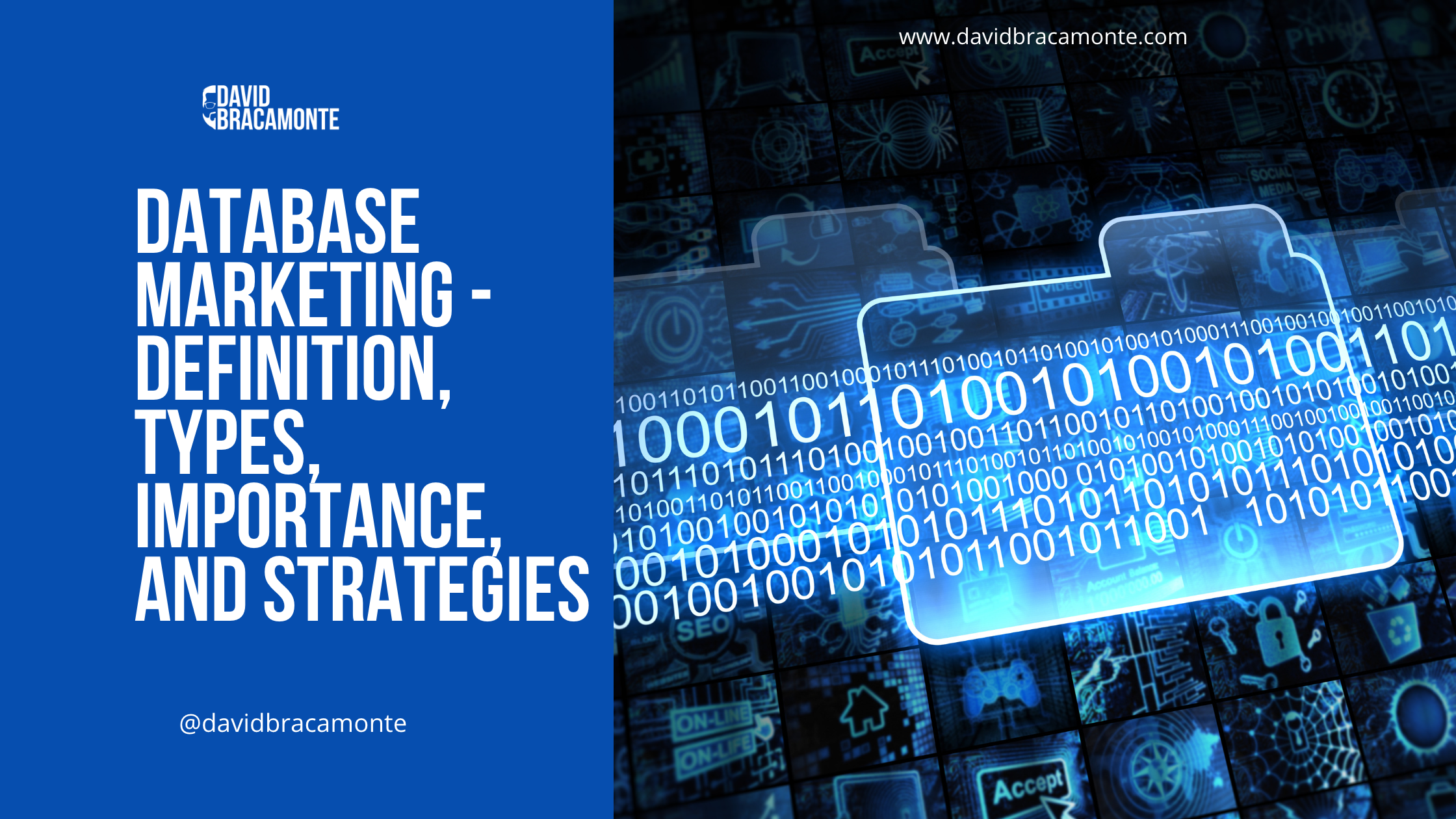Database marketing is a form of direct marketing that utilizes databases of data collected from customers to generate targeted lists for direct marketing communications. Such databases include customers’ names and addresses, phone numbers, emails, purchase histories, information requests, and any other data that can be legally and accurately collected. In this blog article, I focus on Database Marketing – Definition, Types, Importance, and Strategies; I hope you like it.
The database marketing challenges of database definition help organizations better understand and meet the needs of their customers, improving communication and making marketing efforts more effective. Database marketing software helps businesses manage this massive amount of information effectively, streamlining the creation of targeted marketing campaigns.
Different database marketing strategies include consumer database marketing or consumer data only, where businesses collect information about consumers to target their marketing better, and business database marketing, where a company collects data about other interactions for marketing purposes.

The Importance of Database Marketing
The essence of database marketing lies in the concept that the more a company knows about its existing and potential customers beforehand, the better it can design marketing strategies to attract and retain them. For instance, a customer database marketing approach enables a company to tailor offers or services to individual customers based on their preferences and purchasing history.
A database acquisition data management marketing strategy ensures that your company gathers, stores, and analyzes data correctly. This data is then used to make informed marketing decisions, increasing the return on investment (ROI).
The examples of database marketing range from simple email newsletters tailored to individual customer preferences to more complex loyalty programs such data those that reward repeat purchases. A well-maintained database can also help identify potential upsells and cross-sells, maximizing revenue from existing customers.
How Does Database Marketing Strategy Work?
A database marketing strategy typically involves collecting customer information, segmenting that information to create target markets, and then utilizing that data to design marketing campaigns. Advanced customer segmentation goes even further, using sophisticated algorithms to group customers based on diverse characteristics and behaviors.
The power of database marketing lies in the ability to speak directly to your audience members. With a comprehensive understanding of who your potential customers are and what they want, you can deliver personalized messages that resonate with their needs and desires.
Designing a free tool, like a calculator or an app, to gather customer data can also be a way to collect valuable customer data. This tool provides value to the user while allowing the company to collect data that can be used for marketing purposes.

Challenges of Database Marketing
Despite its advantages, database marketing has its challenges. The process of database collection and maintenance can be an expensive endeavor, requiring substantial resources. Moreover, some laws and regulations govern customer data collection, storage, and use, and non-compliance can result in severe penalties.
Not all businesses may have the budget or technical expertise to implement database marketing strategies effectively. Exploring other marketing methods for these businesses, such as social media marketing or search engine optimization (SEO) may be worth exploring.
Additionally, a database marketing strategy’s success heavily relies on the data’s quality. The data must be accurate, up-to-date, and relevant. Data quality can lead to accurate targeting, undermining the benefits of database marketing efforts and negatively affecting customer relationships.
Database marketing offers numerous advantages in reaching customers more effectively and personalizing marketing efforts. However, it comes with its challenges, and businesses need to invest in proper database management systems and follow best practices to make the most out of their database marketing strategies.
Effective Database Marketing Strategies
Database marketing strategies go beyond just collecting customer information. It’s about analyzing, collecting data, interpreting, and utilizing this data to drive marketing efforts. An effective database marketing strategy enables businesses to target their marketing efforts more effectively, ensuring that the right message gets to the right people at the right time.
Creating a database of your target audience involves more than just a list of names and email addresses. It’s about gathering as much information as possible, including demographics, purchasing history, preferences, and behaviors. This in-depth understanding allows you to segment your audience, tailoring your marketing campaigns to different customer groups’ needs and wants.
Loyalty programs that inspire repeat purchases can be a powerful component of a successful database marketing strategy. They allow you to reward loyal customers, encourage repeat business, and gather data about purchasing behaviors. Understanding what motivates your customers to make repeated purchases can help optimize your product offerings and marketing messages.

CRM and Database Tools
Database marketing software and Customer Relationship Management (CRM) tools are crucial in managing and utilizing customer data effectively. These tools allow businesses to store, organize, and analyze customer data, making segmenting customers and creating personalized marketing campaigns easier.
CRM tools can help you identify your best customers, and potential upsells. They provide valuable insights into customer behavior, assisting businesses to predict future behaviors and make informed marketing decisions.
The right database marketing software enables businesses to use customer data quickly and appropriately. Timeliness is key in today’s fast-paced market, and companies must react quickly to changing customer needs and market trends.
Finding the Right Home for Your Database
Not all database homes are created equal; the right choice depends on your business’s needs. The platform’s capacity, security features, integration capabilities, and cost are essential to consider.
Security is fundamental, given the sensitive nature of customer data. A breach can severely damage a company’s reputation, resulting in fines. Therefore, choosing a database platform with robust security features and a good track record is essential.
Your database platform should also integrate well with other systems, such as your CRM or marketing automation platform. Seamless integration allows for efficient data flow, making leveraging customer data in your marketing efforts easier.
Database Marketing Examples
Businesses across various industries utilize database marketing to increase sales and build stronger customer relationships. For instance, a retail company might use purchase history data to send personalized product recommendations to new customers. A SaaS company could use usage data to identify customers ready for an upgrade.
The key is understanding what products and services your ideal customer really needs and then using this information to create relevant, personalized marketing messages. This level of personalization can significantly increase customer engagement and conversion rates.
In conclusion, database marketing has the potential to significantly enhance your marketing efforts, providing a more personalized and efficient approach to reaching your customers. While it does present challenges, with the right strategies and tools in place, businesses can leverage their databases to gain a competitive edge in the marketplace.
Tips for Building a Database Marketing Strategy
Building an effective database marketing strategy requires careful planning and execution. Here are some tips to help you get started.
Firstly, identify who you want to reach. Define your target audience in terms of demographics, behaviors, and preferences. This step lays the foundation for all your marketing activities.
Next, collect customer information. This can be done through various means, such as online forms, customer surveys, transaction data, and transactions. Remember always to respect privacy laws and get explicit consent where required.
Lastly, create a targeting plan using demographic data. Use your collected data to segment your audience and tailor your marketing messages. This increases the relevancy of your communications, which can lead to higher engagement rates.
You should try database marketing if you can
Database marketing can offer substantial benefits to businesses of all sizes. If you have the resources and capabilities to collect, manage, and analyze customer data, you should consider implementing a database marketing strategy.
Database marketing can help you understand your customers more deeply, enabling you to meet their needs effectively. It can also enhance the efficiency of your marketing activities by allowing you to target your communications more precisely.
However, keep in mind that database marketing isn’t a one-size-fits-all solution. Tailoring your strategy to your specific business needs and customer base is important.
Database Marketing – Definition, Types, Importance, and Strategies.
While database marketing offers numerous benefits, it may not suit every business. If you lack the resources to manage and analyze large amounts of data, or if your customer base is small or doesn’t generate much data, you may consider other marketing methods.
Social media marketing, content marketing, and search engine optimization (SEO) can also effectively reach and engage your audience. These methods can be more cost-effective and easier for small businesses or those just starting.
Ultimately, the key to effective marketing is understanding your audience and choosing the methods that allow you to reach them most effectively and efficiently. Whether that involves database marketing, social media marketing, or a combination of approaches will depend on your customer’s future behavior and unique business needs and circumstances.
